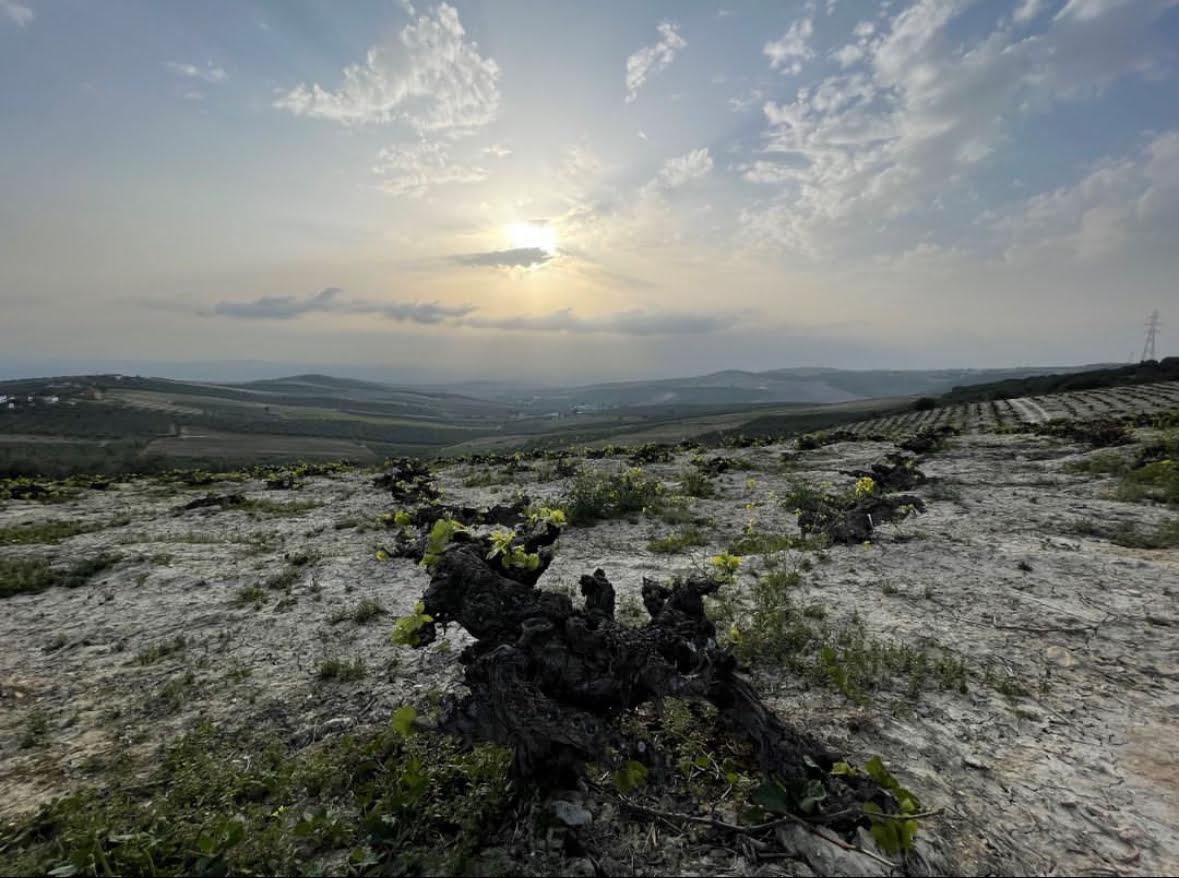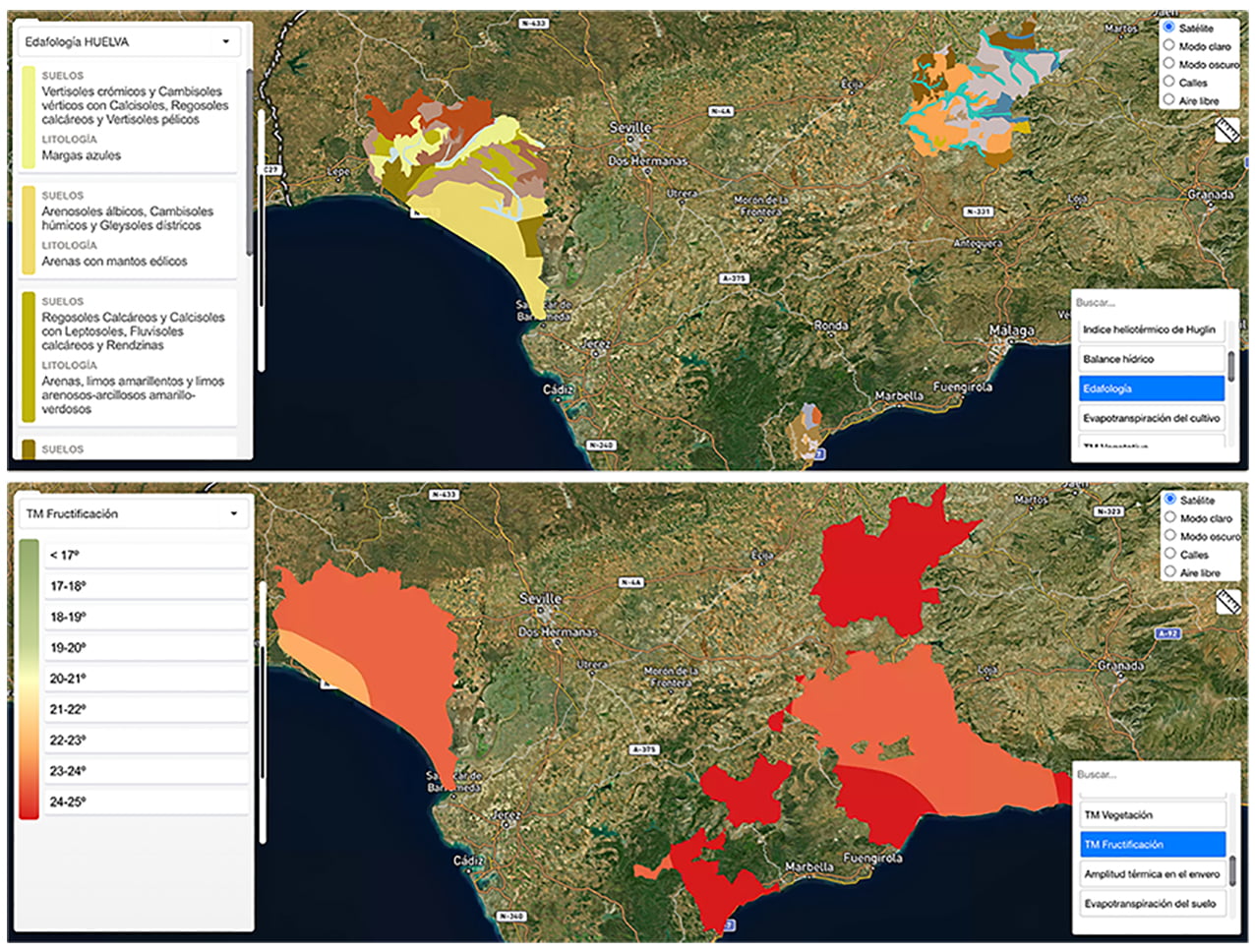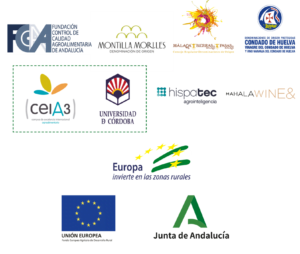
- The research carried out by GOPAGOS confirms the influence of climatic and edaphological factors on the quality of certain vineyards in Córdoba, Málaga and Huelva. This is the first step in the differentiation of historic and exceptional quality vineyards in the PDOs Montilla-Moriles, Málaga and Sierras de Málaga, and Condado de Huelva and Vino Naranja del Condado de Huelva.
- In addition, GOPAGOS has launched a digital tool that gives grape growers access to up-to-date climatic and edaphological information to help them make better decisions and improve the quality of the fruit they produce.
Download images and maps: CLICK HERE
Montilla, 11 September 2024.- The GOPAGOS Operative Group has completed its research and evaluation tasks for the classification of vineyards in the PDOs Montilla-Moriles, Málaga and Sierras de Málaga, and Condado de Huelva and Vino Naranja del Condado de Huelva.
The GOPAGOS Operative Group – Territorial Classification and Management Digitalisation of the Traditional Wine Sector of the PDOs Montilla-Moriles, Málaga, Sierras de Málaga, Condado de Huelva and Vino Naranja del Condado de Huelva was launched two years ago with two clearly defined goals: the creation of an empirical territorial classification and the management digitalisation of the traditional Andalusian wine sector of the appellations of origin involved, in order to focus on the value of each territory and the wines that are produced there.
The research has confirmed the influence of climatic and edaphological factors on the quality of a number of pagos (vineyard sites). Based on scientific data, it is now possible to establish a clear link between environmental characteristics, soils and the quality of vine development in the vineyards studied.
In the case of Montilla-Moriles and Condado de Huelva, their individual regulations may in future include pagos with the greatest historical value or exceptional quality, highlighting the special features that make them unique. On the other hand, in Málaga and Sierras de Málaga, the recognition of the Manilva region is a boost for the development of vineyards and the production of quality wines, thus maintaining winegrowing activity in an area under great pressure from urban development and the resulting abandonment of vineyards.
The representatives of the appellations of origin that took part in this operative group are satisfied and optimistic about the results of GOPAGOS. Thanks to the results of this operative group, other previous studies and classifications will be strengthened, highlighting the importance of terroir and also providing wineries with a digital tool to identify the most suitable land to produce the best quality grapes for the wine they want to make.
As Enrique Garrido, general secretary of the DOs Montilla-Moriles and Vinagre de Montilla-Moriles, explains: «This research is another step towards defining the best lands to produce the best wines and to guarantee the specific origin of these wines, beyond the PDO itself. The fact that this information can be displayed on the label is an opportunity for the wineries and an extra reassurance for the consumer.»
According to Antonio Izquierdo, general secretary of the Regulatory Council of the DOs in Condado de Huelva, this classification will help growers and wineries to «add greater value to their wines, thus improving operating margins and making the business more profitable with additional investment. It will contribute to respecting and preserving the environment in which we live, such as Doñana and Condado de Huelva.»
Fco. Javier Aranda, general secretary of the Regulatory Council of the DOs Málaga, Sierras de Málaga and Pasas de Málaga, explains: “This classification is a boost for vine cultivation in Manilva and will enhance the area’s wine growing activity. Although it has a long tradition, it is not as attractive as other sectors that have gained importance in recent years, especially tourism.”
Research work for objective classification
GOPAGOS previously examined all the available historical and cadastral documentation before carrying out a characterisation of the territory based on edaphoclimatic and cultural criteria.
For the soil analysis, the AGR-165 Edaphology research group of the Agronomy Department at the University of Cordoba conducted a detailed study of the soil in each PDO, based on regional and national lithological and soil maps. This analysis, together with subsequent field visits and information obtained from growers and from samples taken from the various sites, provided the basis to understand the edaphic characteristics of each area.
A total of 21 soil evaluations were carried out by digging soil pits in Manilva (PDO Málaga and Sierras de Málaga), PDO Condado de Huelva, and Montilla-Moriles. Samples were also taken from 85 horizons of interest and 56 auger borings to verify the mapping information. These samples were analysed in the laboratory for various parameters such as moisture, soil texture, carbonate content, organic matter and pH, among others, providing a solid basis for identifying and demarcating the historical pagos. This study is essential to understand the distinctive characteristics of each territory and the results help to define the classification in each appellation of origin.
In addition, the AGR-124 Research Group on Remote Sensing and Precision Agriculture at the University of Córdoba has incorporated all the graphic bases in the vineyard registry of the DOs concerned into a geographical information system. This system has provided the graphical basis for the project’s activities and has been used to support the subsequent digital analysis required.
An innovative digital tool for the future
Climate data is also being collected and analysed with a view to incorporating it, along with soil data, into a digital app. This tool provides a dynamic and updatable territorial information system for the Andalusian wine sector, protected by the appellations of origin concerned. For the GOPAGOS Operative Group, «this tool allows continuous access to up-to-date information on climatic conditions, selected climate indicators for vineyard characterisation and extended classification with edaphological criteria, aspects and permanent slopes.»

The Operative Group says this app is set to become «a tool to facilitate decision-making in the wine sector», thus developing production strategies aimed at improving the quality of grapes and wines, based on a new territorial classification of these appellations of origin, as well as serving as a system to analyse the influence of climate change. It will be available to the growers, wineries and Regulatory Councils of the appellations of origin participating in GOPAGOS.
GOPAGOS Operative Group
GOPAGOS is committed to recovering, organising and characterising the historic vineyards and areas of special interest of the PDOs Montilla-Moriles, Málaga and Sierras de Málaga, and Condado de Huelva and Vino Naranja del Condado de Huelva. Based on factual data, this work will help to handle these vineyards differently and to highlight the origin of their grape production. The aim is to provide a scientific basis for the demarcation of the territory, identifying the pagos according to edaphoclimatic, cultural and human criteria. The research will also validate the influence of climatic and edaphological factors, including biodiversity, coexistence of crops and indigenous vegetation on the boundaries.
The project also includes the creation of a dynamic, updatable and technology-based tool that can be used by the sector for decision-making and to develop production strategies aimed at improving grape and wine quality. This tool, based on a new territorial classification of these appellations of origin, also serves as a system to monitor the influence of climate change.
The GOPAGOS Operative Group – Territorial Classification and Management Digitalisation of the Traditional Wine Sector of the PDOs Montilla-Moriles, Málaga, Sierras de Málaga, Condado de Huelva and Vino Naranja del Condado de Huelva is formed by the Andalusian Foundation for the Control of Agri-Food Quality (FCCAA), PDO Montilla-Moriles, PDO Málaga, PDO Sierras de Málaga, PDO Condado de Huelva, PDO Vino Naranja del Condado de Huelva, International Campus of Excellence in Agri-food (ceiA3), University of Córdoba, Hispatec ERPAgro and MAHALA\Wine&.
The work of the Operative Group took place between September 2022 and September 2024 and was funded by the Andalusian Regional Government through the European Agricultural Fund for Rural Development (EAFRD) for a total of €288,408.66.

#GOPagosAnd




